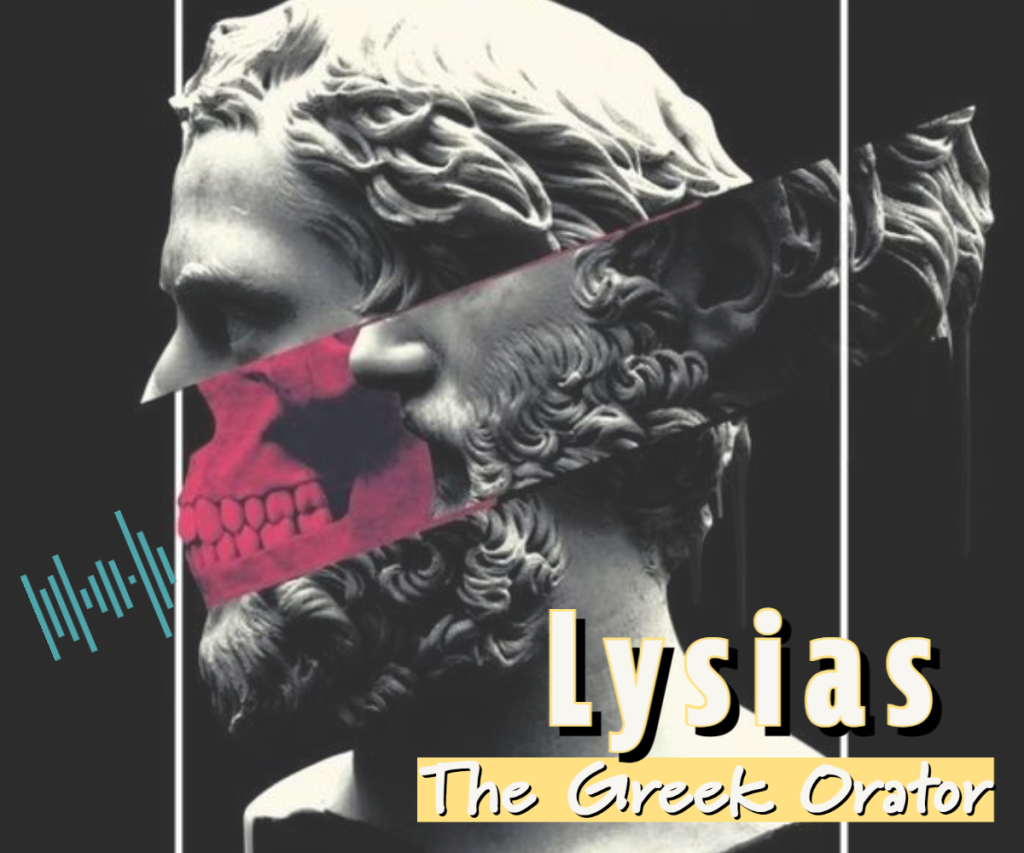Lysias the Greek Orator was said to have been a “man of warm nature, impulsive, hospitable, attached to his friends… carrying into social life the same intellectual quality which marks his best work – the grace and at the temperate brightness of a thoroughly Athenian mind” (Jebb 157).
Scholars debate the birth of Lysias the Greek Orator (Dionysius and Plutarch), placing it to be between 459 and the 440’s BCE. He lived to be approximately 79 years of age. The large number discrepancy is due to the fact that his mother has been proven to still be alive as late as 380 BCE.
However, he was not a citizen of Athens (Jebb 142). At the age of fifteen, he travels to Southern Italy where he was said to have begun to study under Tisias, but he either dropped out or was expelled (Edwards 20). Jebb notes that he may have been kicked off of the Sicilian island with three hundred others who were accused of “atticising” (146).
He returned home to work in the family business of shield making with his brothers, only to be robbed of his land by the Thirty in 1404. The tyrants targeted his family because they were members of the privileged class of resident aliens who didn’t have to pay special taxes.
As a young boy, he grew up in Athens, in the house where Plato sets his Republic and “in the society of the most distinguished Athenians” (Jebb 146).
Lysias the Greek Orator Escapes Death

Jebb transcribes a scene in which Lysias was said to have offered the tyrants a large sum of money in exchange for a chance to escape. The tyrants tricked him into the bribe, but still managed to murder his brother. Lysias though managed to escape.
After the coup of the tyrants, Lysias returns to prosecute Eratosthenes, one of the members of the thirty who was actually believed to be the one to arrest and kill his brother. This case was personal for Lysias; it avenged his former property loss and the death of his brother (Edwards 21).
This is the only forensic speech known to have been spoken by Lysias himself. His activity as a logographer falls “as best as we know” between the years 403 and 380 BCE. After a few years of having gained experience working as a logographer, he offered his help to Socrates, an old friend of the family.
Even though Lysias the Greek Orator wasn’t an official citizen of Athens, his style was still considered Atticistic. His not being a citizen is also what kept him from being able to pursue a law career. His loss of the family business is what led him to become a logographer.
He has written the most speeches of the Alexandrian ten and also the most varied in context. As a human, he is said to have been a:
“man of warm nature, impulsive, hospitable, attached to his friends… carrying into social life the same intellectual quality which marks his best work – the grace and at the temperate brightness of a thoroughly Athenian mind” (Jebb 157).
Classical historians have estimated his death to be around 380 BCE, and argue over whether he died at 66 or the age of 79 (Edwards).
The Plain Style of Lysias the Greek Orator:
Athenian citizens regarded his models to be of “pure and lucid Attic prose”, meaning that he used plain language; not much poetics or metaphors are deployed (Edwards 20). Lysias differs from the fourfold structure, in that he adds an explanatory introduction, usually to the narrative.
His styles and commonplaces are tailored to the individual case or subject. (Edwards). Above all merits, his greatest style was the narration.
“Presentation of character” is what has been argued to be the reason for his success in narration (Porter 64).
And it is this “gullible cuckold” character that drives the popularity of Lysias’ first and most famous speech, “On the Killing of Eratosthenes” (Edwards 22).
| [ebook_store ebook_id=”4786″] | [ebook_store ebook_id=”4740″] |
John R. Porter argues alongside of the ancient Greek Historian, Dionysius, who reports of Lysias the Greek orator being the best of all narrative orators in his article “Adultery by the Book: Lysias 1 (On the murder of Eratosthenes) and Comic Diegesis”.
Porter claims that even though Lysias work sparks interest due to issues of the Athenian bourgeoisie, social history, and the status of women, the real credit lay in his “virtues” of persuasive narrative which
“conveys an engaging and believable impression of the speaker himself” (61).
Jebb opens up his description on the Lysias style by saying that “he was a literary artist”, we just have to understand the context under which he was writing. Some of his speeches may seem weak if they are just studied as rhetorical tools of persuasion, but we must understand who he was writing for. Lysias is best known for adapting language to fit his customer.
If you liked this article on Lysias the Greek Orator, we have similar content studying communication from discourse theory, here.
He didn’t just produce templates for clients, he took the time to make sure the facts were correct, the diction fit the litigant, and that the situation would unfold in plain terms: “Lysias was a discoverer when he perceived that a purveyor of words for others and gave the words the air of being their own” (159).

In describing Lysias’ style as studied under the lens of Cicero’s descriptions of style, Lysias would fit the “plain style”, which was best suited for the law courts. It was Lysias who perfected this, in fact, he is said to be the “canon” of that style by Dionysius and Cicero (162). To extend his merits of the plain canon, Lysias perfected this style when it wasn’t expected.
Writing for the courts was limited to the artistic or the high class, so writing speeches in plain attistic language would have been daring, bold, and new. Lysias was able to write many plain-styled speeches, yet vary their language to fit the litigant’s educational background (164). Lysias himself even considered himself to have developed a plain style after beginning with a style that he thought to be artificial.
Dionysius pronounces “Lysias style to be perfectly pure in expression, the best canon of Attic speech, – not of the old used by Plato and Thucydides, but of that which was in vogue in his own time” (168). Plato describes him as “the best of our writers” (Phaedrus 228a).
If you liked this article, we have similar content studying communication from discourse theory, here.
Usher argues in “Lysias and his Clients” that Plato “acknowledges the breadth of Lysias’ literary field by mentioning his activities as a forensic and political speechwriter, which had been the object of a jibe by a contemporary” (29).
Plutarch records that Lysias is said to have lost in only two of his published speeches and that he also wrote other treatises or exercises (Plutarch, Demosthenes 25).
Works:
Dionysius pronounced 233 of 425 speeches attributed to Lysias to be genuine; 35 have survived in whole or in part (Edwards 21). The Eroticus is included in Plato’s Phaedrus. The majority of his works are forensic.
On the Killing of Eratosthenes (forensic); Funeral Speech 392 BCE (Epideictic); Against Andocides 400 BCE (Forensic); On the Constitution 403 BCE (Deliberative); For Polystratus 410BCE (Forensic)
| [ebook_store ebook_id=”4786″] | [ebook_store ebook_id=”4740″] |






Leave a Reply